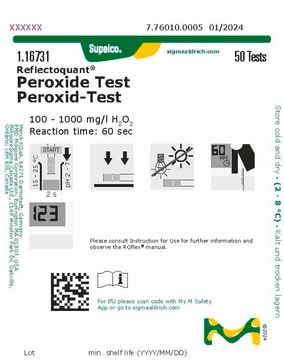MAK311
Peroxide Assay Kit
sufficient for 250 colorimetric tests
Synonym(s):
Hydrogen Peroxide Test Kit
About This Item
Recommended Products
detection method
colorimetric
relevant disease(s)
cardiovascular diseases; aging/geriatric diseases; neonatal diseases; pediatric diseases; orthopedic diseases; neurological disorders; pulmonary disorders
storage temp.
2-8°C
Related Categories
General description
Application
Features and Benefits
Suitability
Principle
Signal Word
Warning
Hazard Statements
Precautionary Statements
Hazard Classifications
Eye Irrit. 2 - Met. Corr. 1 - Skin Irrit. 2
Storage Class Code
8B - Non-combustible corrosive hazardous materials
Flash Point(F)
Not applicable
Flash Point(C)
Not applicable
Certificates of Analysis (COA)
Search for Certificates of Analysis (COA) by entering the products Lot/Batch Number. Lot and Batch Numbers can be found on a product’s label following the words ‘Lot’ or ‘Batch’.
Already Own This Product?
Find documentation for the products that you have recently purchased in the Document Library.
Customers Also Viewed
Our team of scientists has experience in all areas of research including Life Science, Material Science, Chemical Synthesis, Chromatography, Analytical and many others.
Contact Technical Service







